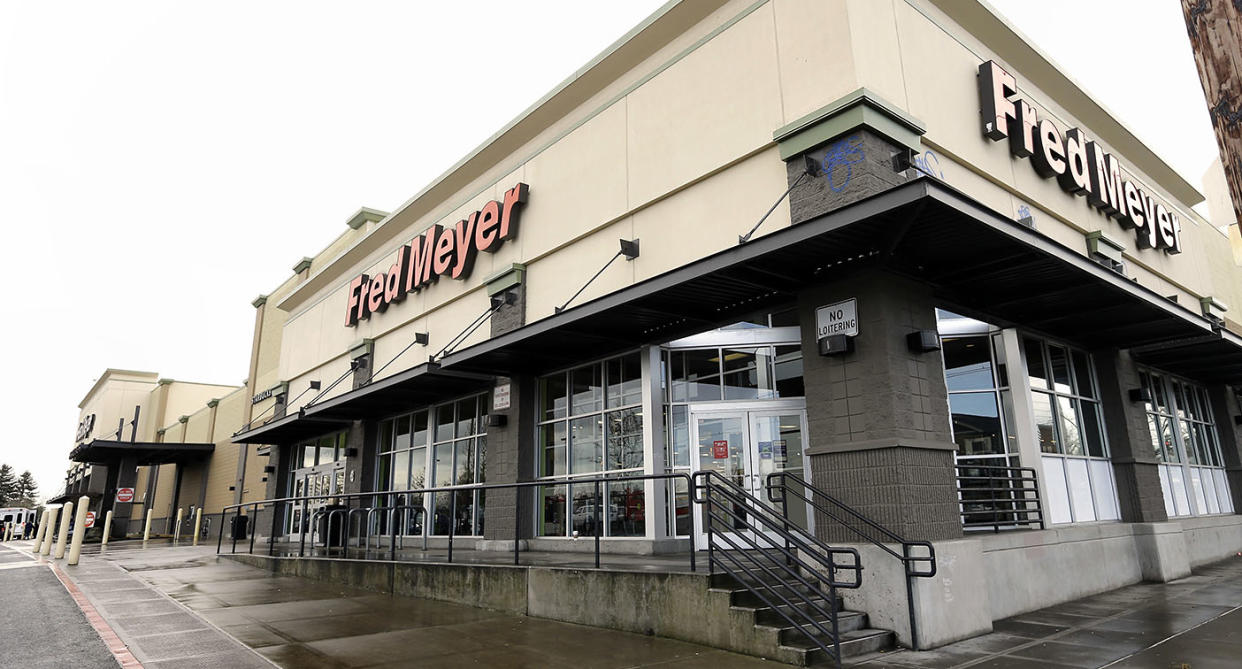Oregon store locks black hair-care products in a case for 'security' reasons

Shoplifting is a costly problem all retailers are constantly trying to combat with a combination of technology and vigilance. At least one supermarket in Portland, Ore., went about its loss prevention in a way that looks to many like a hurtful and sadly familiar form of discrimination. When shopper Sade Rivers visited her local Fred Meyer store recently, she noticed that a section of hair-care products labeled “multi-cultural” was locked in a case, while the rest of the cosmetic products were not.
“Even if I was to ask for someone to open it, now will I be followed through the store?” Rivers asked in an interview with local news station KOIN. “Will they look at me and think, ‘She is probably going to steal that, so let’s keep an eye on her’?”
She walked out of the store without the shampoo and conditioner she’d been meaning to buy because the locked cases made her feel unfairly targeted, she told the station, adding that it was the last time she would shop at Fred Meyer.
“Fred Meyer welcomes every customer who walks in our door,” a spokesperson for the grocery chain told Yahoo in a statement. “Additionally, we train our associates to embrace diversity and inclusion and want to show respect to every customer, and one another, every day. We periodically review items that may require additional security measures. Decisions about product access in our stores are data-driven on a store by store basis. While this case appears to be limited to this one store location, we are reviewing the data with an eye toward our values.”
According to the spokesperson, in addition to the hair products, the store locks up things like power tools, electric toothbrushes, razors, pens, bicycle accessories, and other sporting goods.
The policy sounds similar to one established by Walmart. When Essie Grundy found that she needed to ask a clerk to unlock a case to purchase cosmetics marketed to people of color at a store in California earlier this year, she said, “I felt that I was being treated as a person who might be a thief, even though I have no criminal history.”
Grundy took action, with representation by famed attorney Gloria Allred, and filed a class-action suit accusing Walmart of violating California’s Unruh Civil Rights Act, which states that all people are “entitled to the full and equal accommodations, advantages, facilities, privileges, or services in all business establishments of every kind whatsoever.”
Others have complained of Walmart’s policies in years past. The union-backed group Making Change at Walmart protested in 2016 that some stores in Virginia had placed extra security packaging only on the products marketed for African-Americans.
“Locking up only these products sends a hurtful and insensitive message to Walmart employees and customers, as well as Virginians in the surrounding communities that, frankly, African Americans are more likely to steal such products than their white counterparts,” reads the group’s petition.
In the pre-Twitter era, a forwarded email made the rounds about CVS stores doing this as well.
When Grundy’s lawsuit came to light in January, many took to social media to share their own images of stores where the low-priced black cosmetics were heavily protected while more expensive products for others remained loose on the shelves.
While Rivers’ experience at Fred Meyer has yet to make waves on Twitter, a few people have responded online about her shopping experience.
“Indigineous/African Americans – buy black and buy online! There’s more than one way to get what we need!” JoAnn Lewis tweeted.
"Data driven" must be code for "we think all black people are criminals". pic.twitter.com/bPAGsxQnzE
— Pudge Dredd (@DonovanCaylor) August 22, 2018
“‘Data driven’ must be code for ‘we think all black people are criminals,'” @DonovanCaylor wrote in reply to a tweet from KOIN.
In a thread on Reddit, some expressed sympathy for stores having to battle pervasive shoplifting, but several commenters wondered why the store wouldn’t just put all the hair products into the locked case to avoid the appearance of racial discrimination. For her part, Rivers suggested that the store use cameras to monitor the area instead.
Retail stores have a long history of accusing black and Latino people of shoplifting, frequently garnering headlines for detaining shoppers or instructing employees to monitor people of color more closely. None of this feels new to Rivers.
“As a black person, you are always taught you have to be aware how people look at you, what you say, what you wear, what you look like, because other people perceive you and will judge you based on a stereotype,” she said.
Read more from Yahoo Lifestyle:
• Girl gets removed from Catholic middle school for hairstyle: ‘This decision is going to affect black children more than white children’
• What the Navy’s new hair policy means to me as a black woman
• Texas high school causes outrage with dress code video targeting female students in athletic shorts
Follow us on Instagram, Facebook, and Twitter for nonstop inspiration delivered fresh to your feed, every day.

